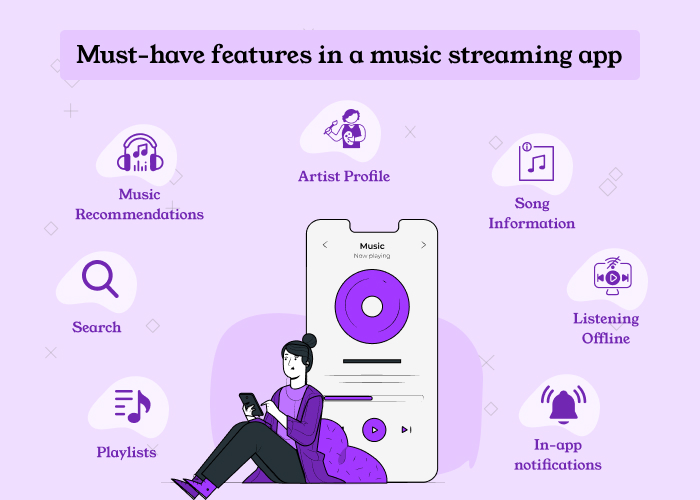The development cost of a music streaming app like Deezer

Must-have features in a music streaming app
To create a mobile app similar to Deezer, programmers must include a wide range of app features that cater to customer preferences and improve the user experience as a whole. Let’s examine each important feature in more detail.
Artist Profile
Dedicated artist profiles provide readers with biographies and associated content, making them an invaluable information resource. This feature immerses users in an engrossing musical exploration while also improving their admiration of their favorite musicians. Thus, in a music streaming app, make sure you allow users to view artist profiles.
Music Recommendations
The seamless integration of algorithmic recommendations is essential to providing a customized user experience. State-of-the-art machine learning algorithms ensure personalized music recommendations by extensively analyzing each listener’s preferences. Users are open to new and significant music through the construction of dynamic playlists or daily mixes, which change based on user preferences and guarantee an engaging voyage of discovery.
Search
Among the key features of the music streaming app is the search tool. Those who want to find their favorite musicians, albums, or songs may do so with ease thanks to the search bar. Advanced search parameters based on genre, artist, album, and release date may be added to improve the user experience even more. This will help consumers narrow down their results and find music more quickly.
Playlists
Individuals make playlists to select music to listen to. Each user may use this to create a personalized music library. Additionally, by enabling friends to participate and share their musical tastes, collaborative playlists promote a feeling of community. Smart playlists give an added degree of excitement by automatically creating unique music selections depending on variables like activity or mood, which further improves engagement and discovery.
Song Information
Having access to thorough information on albums and songs improves the user’s listening experience significantly overall. This contains details such as lyrics, credits, release dates, and graphs. Thus, users can explore and appreciate the music on a deeper level because of this detailed information, which also gives the song context and background.
Listening Offline
Allowing users to save music for offline playback is essential for apps since it helps users during periods when the internet is unavailable. This improves the usability of the app and allows for uninterrupted, fluid music listening even when on the go. Music downloads never stop, so the experience is constant whether it’s done online or off.
In-app notifications
Music applications may establish a strong user connection by using internal messaging. These notifications offer crucial information regarding customized recommendations, new releases, and other relevant industry changes. When done correctly, in-app messaging keeps users engaged and informed about new releases in the music industry.
Conclusion
The mix of user-centric features, seamless functionality, and a vast music library requires a meticulous organization of resources. While the costs associated with such a venture may seem substantial, the potential for success in the dynamic world of digital music is equally significant.
In conclusion, entrepreneurs and businesses aspiring to make a music streaming app must approach the development process with a clear vision, recognizing the unique demands of their target audience. By understanding the key cost components, from app design and development to licensing agreements and server infrastructure, one can navigate the complexities of this industry and create a platform that engages with users.
FAQs
How do I make a music streaming app?
Firstly, list the idea and scope of the app. Thereafter, hire a mobile app development company or dedicated developers to develop the app for you.
What are the primary cost factors in developing a music streaming app like Deezer?
How long does it take to develop a music streaming app?
What licensing agreements are required for a music streaming app?
How can one monetize a music streaming app?
Ravi Bhojani is the Chief Marketing Officer (CMO) at Alian Software, where he spearheads the company’s marketing strategies and drives its brand presence in the competitive IT services landscape. With over a decade of experience in the technology and marketing sectors, Ravi has consistently demonstrated his ability to blend innovative marketing techniques with deep industry knowledge to deliver outstanding results.